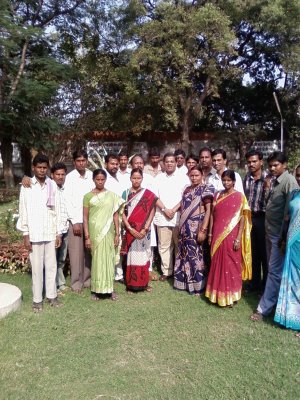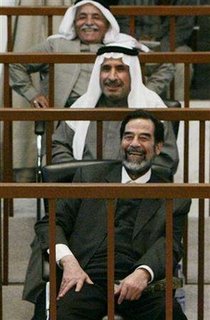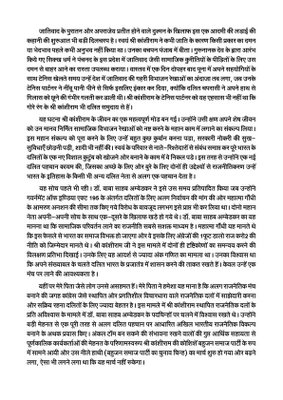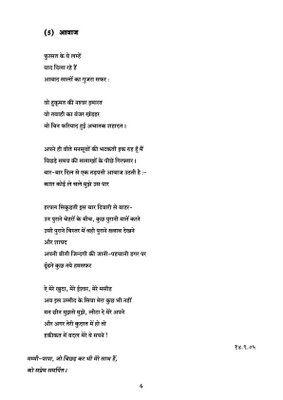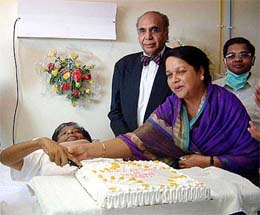 My mother, Dr. (Mrs.) Renu Jogi, has never been in public life. Until my father's accident in April 2004, she worked as an ophthalmic surgeon and a professor at the Government Medical Colleges at Indore and Raipur, having graduated from CMC, Vellore. In fact, most, if not all, pre-final MBBS students have read her text-book 'Basic Ophthalmology' (Jaypee Publishers, New Delhi): like her, the book is simple and to-the-point. She has also co-authored a collection of short stories, Phoolkunwar (Raj Publication, Delhi) with my father besides contributing regularly to the popular Hindi monthly, 'Sarita'. Her book on 'Paediatric Nursing', published by the National Book Trust, was awarded a prize by the Union Ministry of Health and Family Planning.
My mother, Dr. (Mrs.) Renu Jogi, has never been in public life. Until my father's accident in April 2004, she worked as an ophthalmic surgeon and a professor at the Government Medical Colleges at Indore and Raipur, having graduated from CMC, Vellore. In fact, most, if not all, pre-final MBBS students have read her text-book 'Basic Ophthalmology' (Jaypee Publishers, New Delhi): like her, the book is simple and to-the-point. She has also co-authored a collection of short stories, Phoolkunwar (Raj Publication, Delhi) with my father besides contributing regularly to the popular Hindi monthly, 'Sarita'. Her book on 'Paediatric Nursing', published by the National Book Trust, was awarded a prize by the Union Ministry of Health and Family Planning. Mummy is not new to Kota. When my father first fell in love with her in 1973-4, she was already quite popular as a beautiful young 'doctorni' working at the Mission Hospital in our native village, Pendra Road. Even after their marriage, she has remained very active in the area. There isn't a village in the entire region where she hasn't personally conducted an eye-camp. She was instrumental in organizing the 'Rajiv Gandhi Life Line Express'- a hospital-train- at Pendra Road and Kota, where thousands of villagers received life-saving on-the-spot medical treatment.
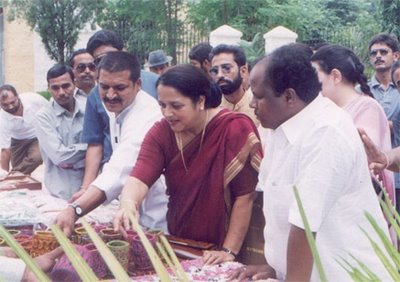 In memory of my late sister, Mummy started the 'Anusha Self-help Group for Women': during the past five years, more than 10,000 women, many of them from Kota, Marwahi, Raigarh and the various Central Jails of the state, have received vocational training in traditional kantha (embroidery) work, bringing about the revival of 'Marwahi Art'. The 'Anusha Ashram' at Gaurella (also in Kota Vidhan Sabha) houses an old people's home, training-centre for girls and has undertaken massive afforestation drives in the township. She also opened the 'Muktidham', so that those abandoned by Fate may be cremated with dignity. Very recently, Mr. Nimrania, who supervises the daily working of the Anusha Ashray, was conferred the most respected citizen award by the township's mayor-in-council: his selection has been unanimous, cutting across party-lines.
In memory of my late sister, Mummy started the 'Anusha Self-help Group for Women': during the past five years, more than 10,000 women, many of them from Kota, Marwahi, Raigarh and the various Central Jails of the state, have received vocational training in traditional kantha (embroidery) work, bringing about the revival of 'Marwahi Art'. The 'Anusha Ashram' at Gaurella (also in Kota Vidhan Sabha) houses an old people's home, training-centre for girls and has undertaken massive afforestation drives in the township. She also opened the 'Muktidham', so that those abandoned by Fate may be cremated with dignity. Very recently, Mr. Nimrania, who supervises the daily working of the Anusha Ashray, was conferred the most respected citizen award by the township's mayor-in-council: his selection has been unanimous, cutting across party-lines. As a doctor working at Raipur's Government Medical College and Hospital, she persuaded certain prominent citizens to contribute towards providing hot meals to the several attendants of outstation patients at a nominal sum of Rs. 2 per meal. The Rajiv Smriti Van, in which thousands of 'memorial trees' have been planted by the loved-ones of those departed on what used to be barren land, too was her brainchild: not surprisingly, it is a favorite haunt with the capital city's lovers and young couples (incidentally, whenever she visits, she makes it a point not to disturb them!). She also prevailed on our state's top industrial houses- Monnet, BALCO and Jindal, to name a few- to 'adopt' public parks, not just in Raipur but also elsewhere: consequently a lot of goodwill, not to mention good publicity, was generated for them in return for beautifying these derelict spaces. It is obvious to me that she believes that governments can be effective only if they involve active private participation. Although I tend to attribute the shaping of my own belief-system on governance to the writings of the Austrian political economist, Friedrich August von Hayek, the fact is that Mummy has proved time and again that what he has written actually works.
 Personally, she is the most courageous person I know. Twice- once after his accident in April 2004 and again when he suffered a stroke in November 2005- she has fought for Papa's life and snatched him from the jaws of death. Not once have I seen her lose her composure, even when Papa and I broke down. When I was in jail, she was my strength: "you are not alone, beta," she would tell me everytime she visited. I wrote a poem for her on her birthday, describing the way I feel about her. For her, it is the best gift I've given her. She is the silent pillar- the anchor- that has held my family together. Even my father's worst opponents hold her in the highest esteem. Everytime I've met Shri Dilip Singh Judeo, he has told me how much he admires her. To me, that speaks a lot about the kind of person she is.
Personally, she is the most courageous person I know. Twice- once after his accident in April 2004 and again when he suffered a stroke in November 2005- she has fought for Papa's life and snatched him from the jaws of death. Not once have I seen her lose her composure, even when Papa and I broke down. When I was in jail, she was my strength: "you are not alone, beta," she would tell me everytime she visited. I wrote a poem for her on her birthday, describing the way I feel about her. For her, it is the best gift I've given her. She is the silent pillar- the anchor- that has held my family together. Even my father's worst opponents hold her in the highest esteem. Everytime I've met Shri Dilip Singh Judeo, he has told me how much he admires her. To me, that speaks a lot about the kind of person she is.Now, when her name is on the front pages of all the state newspapers, she can't imagine what all this fuss is about. Before leaving for Delhi with my father two days ago, I took her aside, and asked her what she wants: 'your father (Papa),' she said, 'is my number one priority'.
AJ
POST-SCRIPT: November 17, 2006. 1:34 a.m.
While the Congress Party is yet to declare its candidate for the Kota bye-election, it has become clear that my mother is not to get the nomination. The reason is the forthcoming elections to the Uttar Pradesh assembly.
The Kota assembly seat has been represented by two Brahmins- Pandit Mathura Prasad Dubey followed by his nephew Pandit Rajendra Prasad Shukla- since Independence. It would therefore send 'a very wrong message' to the electorate of U.P. if a non-Brahmin- i.e., my mother- were given the party ticket from a 'Brahmin seat'. For the record, the Brahmin population in Kota constituency is no more than 2.7% while tribals constitute over 43%.
The choice is now between two candidates: the son of Pandit Rajendra Prasad Shukla, Pandit Sunil Shukla and the city Youth Congress president, who is also called Pandit Rajendra Shukla. The former has already communicated his unwillingness to contest this election; he has also said that in his opinion (shared by the 3 Block Congress Committees of the Kota assembly) my mother is 'the only candidate likely to win'. The latter's greatest asset is his name, which he has in common with the former MLA of this constituency.
As loyal partypersons, we will of course do everything to ensure that the offically declared Congress candidate wins this election.
AJ
Post- Post Script
At 12:50 PM today, my mother, Dr. Renu Jogi, was officially declared as the Congress candidate. She filed her nomination papers before the Returning Officer at 2:40 PM, less than twenty minutes before closing time.
She has begun campaigning in earnest.
AJ
THE RESULT COVERAGE ON SAHARA TV:
Read More (आगे और पढ़ें)......
